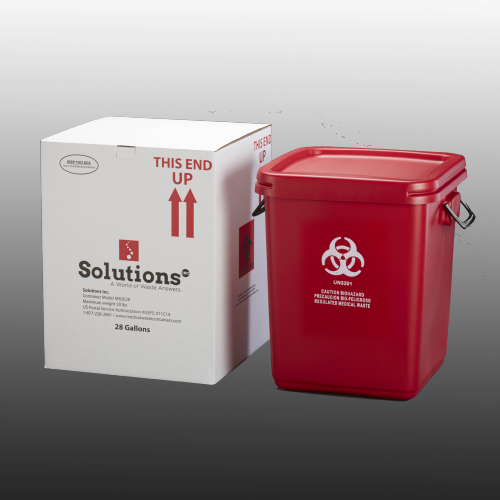Navigating Medical Garbage Disposal: Essential Services for Health Care Facilities
In the detailed landscape of medical care procedures, the management of medical waste is an essential aspect that demands precise interest. Medical care centers, whether big hospitals or small centers, are entrusted with the obligation of handling, treating, and taking care of a large range of medical waste streams. The complexities associated with navigating with the regulative needs, making sure proper waste partition, and executing safe collection and transportation procedures are extremely important. Understanding the important solutions that sustain medical waste disposal is not simply an issue of compliance but additionally a basic element in protecting public health and wellness and environmental well-being. The details of this procedure are crucial for health care facilities, and the knowledge provided in this realm plays a crucial function in maintaining the integrity of medical care systems.
Regulatory Compliance Support
For medical care centers, making certain regulative compliance assistance is vital to preserve correct handling and disposal of clinical waste. By partnering with governing conformity professionals, health care facilities can remain current on advancing laws, reduce risks associated with inappropriate waste disposal, and eventually contribute to a safer and more lasting atmosphere for all.
Waste Segregation Assistance

Medical care facilities should give clear guidelines and training to team on just how to set apart waste efficiently. This consists of dividing basic waste from dangerous products such as sharps, infectious waste, pharmaceuticals, and chemical waste. Color-coded containers, tags, and signage are frequently made use of to aid in waste partition practices. Routine audits and surveillance of waste partition processes are crucial to identify any issues and make required enhancements.
Collection and Transport Providers

Proper collection and transportation solutions are crucial parts of the clinical garbage disposal process in healthcare facilities. These services guarantee that hazardous materials are taken care of securely and in conformity with guidelines to shield both the setting and public health. Health care centers rely upon specialized waste management companies to offer effective collection and transportation services customized to their needs.
Clinical waste collection entails setting apart various kinds of waste at the point of generation, utilizing color-coded bins or bags to identify in between general, harmful, pharmaceutical, and various other waste streams. Trained workers need to execute this task to stop contamination and ensure proper disposal. When gathered, the waste is carried in specialized cars outfitted to take care of hazardous products safely. These vehicles stick to strict safety and recommended you read security criteria and follow assigned routes to qualified treatment centers for disposal through methods such as sanitation, incineration, or landfilling.
Therapy and Disposal Solutions
In the world of clinical waste disposal for medical care centers, after the vital phase of collection and transportation services, the focus moves towards applying efficient therapy and disposal options. Treatment services commonly involve processes such as autoclaving, which makes use of steam under pressure to sanitize the waste. This technique is frequently used for contagious waste that needs to be provided non-hazardous prior to disposal. An additional prevalent treatment technique is incineration, where waste undergoes heats in controlled setups to decrease its volume and get rid of microorganisms.
Disposal solutions incorporate the final action in the medical waste monitoring process. Facilities might select landfill disposal, where dealt with waste is thoroughly deposited in marked areas. Medical Waste Disposal Services. Alternatively, medical care centers can select to use waste-to-energy facilities, which incinerate waste to generate electricity. Reusing and source recuperation are likewise gaining traction as sustainable disposal choices for certain kinds of clinical waste materials.
Reliable therapy and disposal solutions are extremely important in guaranteeing conformity with regulations and protecting public health and wellness and the environment. Health care centers must very carefully evaluate and pick appropriate techniques that straighten with their waste monitoring goals and sustainability efforts.
Staff Training and Education

To efficiently handle clinical waste disposal in medical care centers, thorough team training and education and learning play an essential function in making sure adherence to regulative requirements and maintaining a secure atmosphere. Proper training equips team with the understanding and skills required to manage different sorts of clinical waste, segregate them properly, and package them securely for disposal. By enlightening workers on the threats connected with incorrect handling of medical waste, centers can minimize the likelihood of crashes, contamination, and regulative violations.

Final Thought
In verdict, health care facilities rely upon essential medical garbage disposal services to guarantee regulative conformity, appropriate waste segregation, safe collection and transportation, efficient therapy and disposal, along with staff training and education. These solutions play a vital function in preserving the health and wellness of both health care employees and the public, highlighting the value of proper monitoring of medical waste in medical care settings.
For health care facilities, ensuring regulatory compliance support is necessary to keep correct handling and disposal of clinical waste. Waste partition includes classifying different types of medical waste to ensure ideal handling, therapy, and disposal. This includes dividing general waste from unsafe materials such as sharps, transmittable waste, pharmaceuticals, and chemical waste.Clinical waste collection includes setting apart different types of waste at the point of generation, utilizing color-coded bins or bags to differentiate between general, unsafe, pharmaceutical, and various other waste streams.In the realm of clinical waste disposal for healthcare centers, after the important stage of collection and transport services, the focus moves towards executing reliable therapy and disposal services.